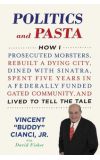
06 Apr 2011 02:32:45
The denizens of the Democratic machine that had run the city for 30 years had trashed the place, he said, nailing wallboard over the historic building's mahogany paneling and poking pencils through the eyes of the portraits of former mayors.
His predecessors had left Providence in terrible shape. The city's old industrial base had crumbled, its infrastructure was falling apart, its rivers were paved over with concrete, downtown storefronts were boarded up, its wealth of historical buildings were deteriorating, its tax base was imploding and the prevailing mood was despair. It was hard to find anyone but Buddy who thought the city had a future.
But this young Republican-in-name-only (he later ran as an independent) had dreams of turning the city into a showplace.
Today, Providence makes national magazines' lists of the best places to live. It boasts of the biggest retail mall in New England, a revitalized downtown, winding rivers with gondolas and water taxis, restored historic buildings, a vibrant arts community and a remarkable assortment of great restaurants.
While not all of this was realized during Cianci's 21 years as mayor, even his detractors — and they are legion — acknowledge that he envisioned it and made much of it happen. But progress came at a cost.
Former Rhode Island Gov. Lincoln C. Almond once claimed that the rebirth came with a 30 percent corruption tax. And Cianci himself ended up spending nearly five years in a federal prison for running the city government as a criminal conspiracy.
Cianci has already been the subject of one political biography: Mike Stanton's best-selling "The Prince of Providence" focused on the dark side, recounting the charges against him.
Now, in "Politics and Pasta," Cianci has his say. His memoir is by turns insightful and evasive, serious and funny, self-deprecatory and self-serving.
He cops to none of the corruption accusations, writing that he was found not guilty of each specific criminal act, including soliciting bribes, that was brought against him. He never took a bribe — "not one cent," he says — and maintains that he was unaware of the activities of other members of his administration who were convicted of doing so. His conspiracy conviction, he asserts, amounts to being found guilty of having served as mayor.

